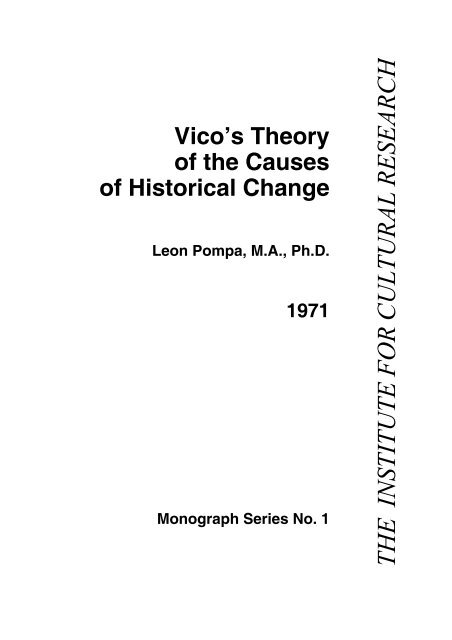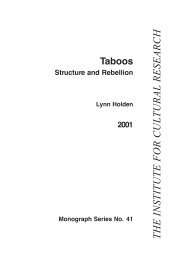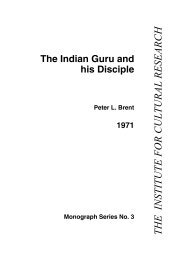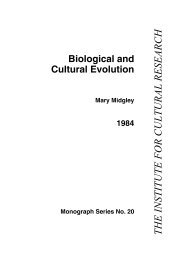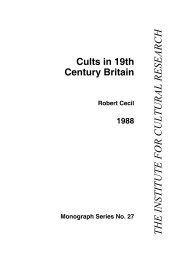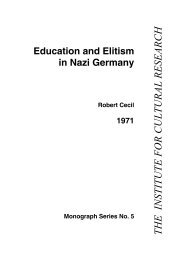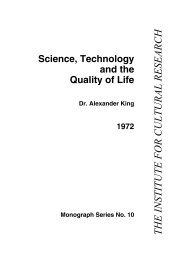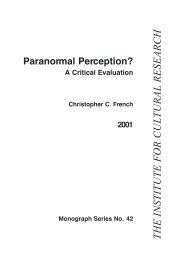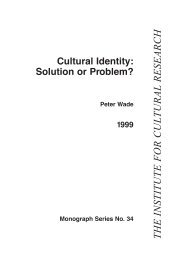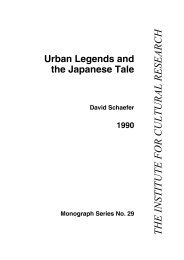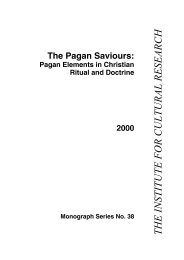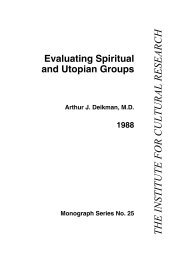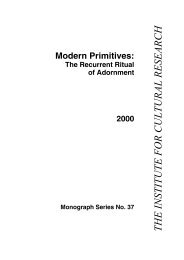Vico's Theory of the Causes of Historical Change - The Institute For ...
Vico's Theory of the Causes of Historical Change - The Institute For ...
Vico's Theory of the Causes of Historical Change - The Institute For ...
You also want an ePaper? Increase the reach of your titles
YUMPU automatically turns print PDFs into web optimized ePapers that Google loves.
Vico’s <strong><strong>The</strong>ory</strong><br />
<strong>of</strong> <strong>the</strong> <strong>Causes</strong><br />
<strong>of</strong> <strong>Historical</strong> <strong>Change</strong><br />
Leon Pompa, M.A., Ph.D.<br />
1971<br />
Monograph Series No. 1<br />
THE INSTITUTE FOR CULTURAL RESEARCH
Copyright © 1971 <strong>The</strong> <strong>Institute</strong> for Cultural Research<br />
<strong>The</strong> right <strong>of</strong> <strong>the</strong> <strong>Institute</strong> for Cultural Research to be identified as <strong>the</strong> owner<br />
<strong>of</strong> this work has been asserted by <strong>the</strong>m in accordance with <strong>the</strong> Copyright,<br />
Designs and Patents Act 1988.<br />
All rights reserved<br />
Copyright throughout <strong>the</strong> world<br />
No part <strong>of</strong> this publication may be reproduced or transmitted in any form or<br />
by any means, electronic, mechanical or photographic, by recording or any<br />
information storage or retrieval system or method now known or to be<br />
invented or adapted without prior permission obtained in writing from <strong>the</strong><br />
publisher, <strong>The</strong> <strong>Institute</strong> for Cultural Research, except by a reviewer quoting<br />
brief passages in a review written for inclusion in a journal, magazine,<br />
newspaper or broadcast.<br />
Requests for permission to reprint, reproduce, etc. to:<br />
<strong>The</strong> <strong>Institute</strong> for Cultural Research, PO Box 2227, London NW2 3BW<br />
ICR Monograph Series No. 1<br />
This version prepared for free download 2006.<br />
<strong>The</strong> original hard copy edition:<br />
ISSN 0306 1906 – ISBN 0 950002 92 5 – Published 1971<br />
may be purchased from <strong>the</strong> address given above, or on <strong>the</strong> ICR website,<br />
www.i-c-r.org.uk<br />
Opinions expressed in monographs published by <strong>the</strong> <strong>Institute</strong> for Cultural<br />
Research are to be regarded as those <strong>of</strong> <strong>the</strong> authors.<br />
2
THE AUTHOR<br />
Leon Pompa was Pr<strong>of</strong>essor <strong>of</strong> Philosophy, 1977–1997 (now Pr<strong>of</strong>essor<br />
Emeritus), in <strong>the</strong> University <strong>of</strong> Birmingham. His many publications include:<br />
Vico: A study <strong>of</strong> <strong>the</strong> ‘New Science’ (Cambridge University Press, 1975;<br />
revised and enlarged, CUP, 1990); Vico: Selected writings, ed. and trans.<br />
(CUP, 1982); Human Nature and <strong>Historical</strong> Knowledge: Hume, Hegel and<br />
Vico (CUP, 1990; first paperback ed. CUP, 2002); Vico: <strong>The</strong> First New<br />
Science, ed. and trans. (CUP, 2002).<br />
This monograph is a transcript <strong>of</strong> a lecture delivered to <strong>the</strong> <strong>Institute</strong> for<br />
Cultural Research on 17th October, 1970.<br />
3
Vico’s <strong><strong>The</strong>ory</strong> <strong>of</strong> <strong>the</strong> <strong>Causes</strong> <strong>of</strong><br />
<strong>Historical</strong> <strong>Change</strong><br />
I am going to try this evening to bring out certain aspects <strong>of</strong> <strong>the</strong> thought <strong>of</strong> <strong>the</strong><br />
Italian philosopher, Giambattista Vico, which can help us in trying to<br />
understand what people sometimes call “our human condition.” I shall not be<br />
concerned so much to show that <strong>the</strong>se <strong>the</strong>ories are true or false, as to show<br />
that <strong>the</strong>y open up interesting and pr<strong>of</strong>itable ways <strong>of</strong> thinking about ourselves<br />
and <strong>the</strong> situation we are in.<br />
I shall begin by saying something fairly brief about Vico himself, because<br />
he is not a philosopher who attracted very much attention until he was<br />
rediscovered first by <strong>the</strong> great French historian, Michelet, in <strong>the</strong> 19th century,<br />
and <strong>the</strong>n by <strong>the</strong> Italian philosopher, Croce, and his successors in this century.<br />
But even so, interest in him has largely remained confined to Italy. <strong>The</strong>re are<br />
a number <strong>of</strong> reasons for this but I’m not going to go into <strong>the</strong>m except to say<br />
that, in <strong>the</strong> end, it is <strong>the</strong> sheer obscurity <strong>of</strong> his writings that has stood as a<br />
barrier to any general interest in his thought.<br />
<strong>The</strong> events <strong>of</strong> Vico’s life make a very unexciting story. He was born in<br />
1668 in Naples, <strong>the</strong> son <strong>of</strong> a bookseller. And, apart from a few years spent as<br />
tutor to a Cardinal’s nephew at a place just outside Naples, he never left <strong>the</strong>re.<br />
He died in 1744, in <strong>the</strong> same year that <strong>the</strong> final and most complete version <strong>of</strong><br />
his greatest work, <strong>the</strong> New Science was published. <strong>For</strong> most <strong>of</strong> his life, i.e.<br />
from 1699–1741, he was a ra<strong>the</strong>r obscure Pr<strong>of</strong>essor <strong>of</strong> Rhetoric at <strong>the</strong><br />
University <strong>of</strong> Naples, and though he wrote and had published a number <strong>of</strong><br />
works on philosophy and history during this time, <strong>the</strong>se never had much<br />
general impact. So he never came to have an international reputation during<br />
his own lifetime and he never entered into <strong>the</strong> kind <strong>of</strong> debate with o<strong>the</strong>r<br />
philosophers which might have provoked him into trying to express himself<br />
more clearly and to remove <strong>the</strong> ambiguities from his thought.<br />
I want, however, to mention two features <strong>of</strong> <strong>the</strong> intellectual life <strong>of</strong> his<br />
time which will help explain why Vico became interested in certain things<br />
and what it was he hoped he could do in <strong>the</strong>se matters. <strong>The</strong> first is that <strong>the</strong><br />
prevailing school <strong>of</strong> philosophy on <strong>the</strong> Continent was that <strong>of</strong> <strong>the</strong> Rationalists,<br />
i.e. followers <strong>of</strong> one kind or ano<strong>the</strong>r <strong>of</strong> <strong>the</strong> philosophy <strong>of</strong> Descartes. Now, one<br />
<strong>of</strong> <strong>the</strong> main features <strong>of</strong> <strong>the</strong> thought <strong>of</strong> <strong>the</strong>se philosophers was <strong>the</strong>ir search for<br />
certainty in knowledge and <strong>the</strong>ir decision to accept nothing as true which<br />
could not be shown to be absolutely certain. By and large <strong>the</strong> Rationalists had<br />
4
concluded that we could be certain about things if <strong>the</strong>y were things whose<br />
behaviour was absolutely determined by certain causes. <strong>The</strong>refore <strong>the</strong>y<br />
thought that we could, for example, have knowledge in <strong>the</strong> field <strong>of</strong> <strong>the</strong> natural<br />
sciences or <strong>the</strong> material world, because that world was fully determined.<br />
Once one knew <strong>the</strong> causes <strong>of</strong>, say, condensation, evaporation, and<br />
precipitation one could formulate <strong>the</strong> laws which govern <strong>the</strong> fall <strong>of</strong> rain and,<br />
with knowledge <strong>of</strong> conditions on any particular day, one could predict with<br />
complete confidence whe<strong>the</strong>r or not it would rain or snow and so on.<br />
But one field in which we could not have such certainty was that <strong>of</strong><br />
history. And <strong>the</strong> reason for this was quite simple: <strong>the</strong> actions and deeds <strong>of</strong><br />
human beings, which were <strong>the</strong> main part <strong>of</strong> history, were not fully<br />
determined. <strong>The</strong>y were caused, certainly, but not determined. <strong>For</strong> <strong>the</strong>ir causes<br />
were <strong>the</strong> motives, and intentions and so on, <strong>of</strong> human beings; and <strong>the</strong> motives<br />
and intentions which determine <strong>the</strong> actions <strong>of</strong> human beings were not<br />
<strong>the</strong>mselves determined, in <strong>the</strong> way that, say, <strong>the</strong> movements <strong>of</strong> <strong>the</strong> atoms<br />
which determined <strong>the</strong> movements <strong>of</strong> physical events were <strong>the</strong>mselves<br />
determined. It may be true that I go to <strong>the</strong> <strong>the</strong>atre because I want to be<br />
entertained, but I don’t have to want to be entertained. So my going to <strong>the</strong><br />
<strong>the</strong>atre is not an absolutely, or fully, determined occurrence. So because <strong>of</strong><br />
<strong>the</strong> importance <strong>of</strong> human motives and intentions in determining human<br />
actions, <strong>the</strong> latter lack <strong>the</strong> fully deterministic character <strong>of</strong> events in <strong>the</strong> world.<br />
Consequently when an historian tells us that a certain historical person did<br />
something for a certain reason, we can never be sure this is correct. An agent<br />
might always have had any <strong>of</strong> a number <strong>of</strong> reasons for his action and, as we<br />
cannot see directly into o<strong>the</strong>r people’s minds, and particularly not into <strong>the</strong><br />
minds <strong>of</strong> past people, our explanations may always be wrong. Consequently<br />
<strong>the</strong>re can be no knowledge <strong>of</strong> historical causes, no science <strong>of</strong> history and no<br />
genuine knowledge <strong>of</strong> history.<br />
At <strong>the</strong> same time, however, as <strong>the</strong> philosophers were coming to <strong>the</strong>se<br />
gloomy conclusions about <strong>the</strong> possibility <strong>of</strong> historical knowledge, history<br />
itself, in <strong>the</strong> hands <strong>of</strong> historians, had taken some fairly important strides<br />
forward. <strong>The</strong> initial impetus for this had been <strong>the</strong> claims made by Lu<strong>the</strong>r in<br />
<strong>the</strong> Reformation and by his Catholic opponents in <strong>the</strong> Counter-reformation.<br />
<strong>The</strong>se conflicting claims about <strong>the</strong> nature <strong>of</strong> <strong>the</strong> Christian religion had made<br />
it a matter <strong>of</strong> urgency to try to establish which parts <strong>of</strong> <strong>the</strong> Bible were true and<br />
how <strong>the</strong>se sacred writings should be understood. So <strong>the</strong>re had first been great<br />
improvements in developing a sound critical approach to <strong>the</strong> interpretation <strong>of</strong><br />
<strong>the</strong> historical aspect <strong>of</strong> religious writings. This had <strong>the</strong>n gained an impetus <strong>of</strong><br />
its own and spread to <strong>the</strong> whole <strong>of</strong> historical enquiry, resulting in <strong>the</strong> great<br />
compilations <strong>of</strong> properly edited historical documents which first began to be<br />
produced in <strong>the</strong> 17th century.<br />
5
But though <strong>the</strong>re had been great advances in <strong>the</strong> critical approach to<br />
historical evidence <strong>the</strong> results <strong>of</strong> this still fell a long way short <strong>of</strong> Descartes’<br />
ideal. Historians were in a better position to establish what happened but <strong>the</strong>y<br />
still couldn’t go beyond this and explain why it happened for <strong>the</strong>y still<br />
couldn’t see how to gain certain knowledge <strong>of</strong> <strong>the</strong> minds <strong>of</strong> <strong>the</strong> agents in<br />
history. Consequently <strong>the</strong>y couldn’t establish <strong>the</strong> causes <strong>of</strong> historical change<br />
and formulate laws which stated what <strong>the</strong>se were. So it still looked as though<br />
Descartes was right: in <strong>the</strong> natural sciences we could understand what<br />
happened because we could formulate laws giving <strong>the</strong> causes <strong>of</strong> things. In<br />
history we could not really understand what happened because we could<br />
never be certain that we knew what caused people to act in <strong>the</strong> ways <strong>the</strong>y did.<br />
Well, this position struck Vico as very odd, perhaps because he was both<br />
a philosopher and an historian. He began life as a follower <strong>of</strong> Descartes. But<br />
during his career he carried out a lot <strong>of</strong> research into history, particularly into<br />
Greek and Roman history, and it seemed to him that it was possible to have<br />
knowledge both <strong>of</strong> what happened and <strong>of</strong> why it happened. So, if, according<br />
to Descartes, such knowledge was impossible, <strong>the</strong>re must be something<br />
wrong somewhere with Descartes’ philosophy. Vico <strong>the</strong>refore began by<br />
asking himself what was wrong with <strong>the</strong> way most o<strong>the</strong>r philosophers were<br />
looking at history, which was bringing <strong>the</strong>m to <strong>the</strong>se wrong conclusions. And<br />
from this he went on to formulate a <strong>the</strong>ory about <strong>the</strong> way <strong>the</strong>y should try to<br />
approach history and to show that if <strong>the</strong>y did it in this way, genuine<br />
knowledge could be reached.<br />
<strong>The</strong> first thing that Vico drew attention to in <strong>the</strong> work <strong>of</strong> o<strong>the</strong>r<br />
philosophers was that most <strong>of</strong> <strong>the</strong>m had a faulty conception <strong>of</strong> man. <strong>The</strong>y had<br />
defined history, quite correctly, as consisting <strong>of</strong> <strong>the</strong> actions and deeds <strong>of</strong> man,<br />
but because <strong>the</strong>y had an incorrect view <strong>of</strong> man’s nature <strong>the</strong>y had come to <strong>the</strong><br />
erroneous conclusion that one could never know <strong>the</strong> causes <strong>of</strong> <strong>the</strong>se actions.<br />
According to Vico <strong>the</strong>ir mistake here had been to take man to be a<br />
self-dependent entity, i.e. to think <strong>of</strong> each individual person as constituting an<br />
independent unity, <strong>the</strong> causes <strong>of</strong> whose activity were wrapped up within<br />
himself. Descartes, for example, had thought this, and this was what really<br />
lay behind his scepticism about historical knowledge. <strong>For</strong> Descartes had<br />
argued that since <strong>the</strong> causes <strong>of</strong> <strong>the</strong> actions <strong>of</strong> each person lay within himself,<br />
<strong>the</strong> only person who could be fully certain why he acted as he did on any<br />
particular occasion was that person himself. And he could know this because<br />
he had direct acquaintance, so to speak, with his own thoughts, whereas<br />
somebody else could only try to infer what <strong>the</strong>se thoughts were and so could<br />
always be wrong about <strong>the</strong>m. <strong>The</strong> first thing that Vico objected to in this view<br />
<strong>of</strong> man’s nature was its anti-social character. It thought <strong>of</strong> individual human<br />
beings as being altoge<strong>the</strong>r too unaffected by each o<strong>the</strong>r and consequently<br />
6
attributed far too much importance to <strong>the</strong> role <strong>of</strong> free-will and, in general,<br />
purely individualistic factors in <strong>the</strong> explanation <strong>of</strong> <strong>the</strong>ir actions.<br />
Now Vico, who was a devout Christian, did not want to deny that<br />
individuals had free-will but he thought <strong>of</strong> this as much more <strong>of</strong> a potentiality<br />
than an actuality and he thought that its actual operation was much<br />
exaggerated in <strong>the</strong> account Descartes gave. <strong>For</strong> <strong>the</strong> first thing that that<br />
account overlooked was that, though people’s actions were governed by <strong>the</strong>ir<br />
motives, <strong>the</strong>ir beliefs about things and <strong>the</strong>ir attitudes to things, <strong>the</strong>se motives,<br />
beliefs and attitudes, what I shall call <strong>the</strong> contents <strong>of</strong> human consciousness,<br />
were not formed by each individual for himself, but were largely inculcated<br />
into him by first, <strong>the</strong> type <strong>of</strong> family background he had, <strong>the</strong>n <strong>the</strong> sort <strong>of</strong><br />
education (i.e. both formal and informal education) he underwent, <strong>the</strong>n by <strong>the</strong><br />
sort <strong>of</strong> position he held in society. In o<strong>the</strong>r words, <strong>the</strong> free-will with<br />
which people were born was really only a freedom to come to have whatever<br />
beliefs about things and attitudes towards <strong>the</strong>m <strong>the</strong>y were trained and<br />
educated into having.<br />
So <strong>the</strong> first way in which Vico wanted to modify current philosophical<br />
<strong>the</strong>ories about man was by replacing <strong>the</strong> conception <strong>of</strong> man as a<br />
self-contained and self-determining being, by that <strong>of</strong> man as a socially<br />
conditioned entity, i.e. as a being who acquired a large part <strong>of</strong> what we would<br />
call his human nature in <strong>the</strong> course <strong>of</strong> being brought up in society.<br />
Now it might seem that this point would be enough to enable Vico to<br />
reject Descartes’ historical scepticism. <strong>For</strong> if an historian wanted to know<br />
what were <strong>the</strong> motives or aims behind <strong>the</strong> actions <strong>of</strong> any particular historical<br />
agent, he wouldn’t be denied this because he couldn’t gain access to <strong>the</strong><br />
hidden interior <strong>of</strong> that person’s mind. What he needed would be a correct<br />
account <strong>of</strong> <strong>the</strong> family, educational and social backgrounds that that individual<br />
had had and he would <strong>the</strong>n be in a position to know and understand <strong>the</strong><br />
attitudes and beliefs which that individual had come to possess and which<br />
determined his actions in any particular circumstances.<br />
But, as a matter <strong>of</strong> fact, one really couldn’t reject historical scepticism for<br />
this reason alone. <strong>For</strong> even if Vico’s account were accepted, for each<br />
particular individual one would have to know <strong>the</strong> details <strong>of</strong> his own<br />
individual family background, <strong>the</strong> sort <strong>of</strong> training he received in this, <strong>the</strong>n <strong>the</strong><br />
details <strong>of</strong> all <strong>the</strong> people he met in his social life, what <strong>the</strong>y said to him and so<br />
on. If he wanted, for example, to understand just what made, say, Henry II act<br />
as he did towards Thomas Beckett, or Beckett as he did towards Henry II, we<br />
should have to have a whole account <strong>of</strong> all <strong>the</strong> particular people who had ever<br />
affected or influenced both men. And, <strong>of</strong> course, <strong>the</strong> bulk <strong>of</strong> <strong>the</strong>se people<br />
leave little or no historical trace at all, so that <strong>the</strong>re would be no evidence to<br />
enable us to know who and what <strong>the</strong>y were. So Vico would be no fur<strong>the</strong>r<br />
7
forward in his desire to show how we could have historical knowledge.<br />
Well Vico was not worried by this objection because it was based upon<br />
ano<strong>the</strong>r faulty philosophical conception: it thought <strong>of</strong> society itself as being<br />
just an aggregate <strong>of</strong> individual people. But <strong>the</strong> truth, Vico argued, was that<br />
society had a certain structure which transcended, i.e. could not be explained<br />
by, <strong>the</strong> activities <strong>of</strong> individuals qua individuals and which, in fact,<br />
determined <strong>the</strong> nature <strong>of</strong> many <strong>of</strong> <strong>the</strong> beliefs and attitudes which individuals<br />
held in common. In fact, what Vico now produced was a <strong>the</strong>ory <strong>of</strong> class<br />
structure, ra<strong>the</strong>r similar to that which Marx formulated, though Vico’s <strong>the</strong>ory<br />
predated that <strong>of</strong> Marx by just about a hundred years.<br />
Now <strong>the</strong> essential point in this part <strong>of</strong> Vico’s <strong>the</strong>ory is that society, ra<strong>the</strong>r<br />
than being composed <strong>of</strong> an aggregate <strong>of</strong> individual people, really constituted<br />
a sort <strong>of</strong> unity, i.e. had a unified structure, and <strong>the</strong> sort <strong>of</strong> beliefs, attitudes,<br />
etc., which individuals have are to be explained by <strong>the</strong>ir place in this<br />
structure. To know, for example, <strong>the</strong> beliefs and attitudes which lay behind a<br />
certain course <strong>of</strong> action, one didn’t need to have access to <strong>the</strong> hidden interior<br />
<strong>of</strong> an individual’s mind, nor even to <strong>the</strong> details <strong>of</strong> all <strong>the</strong> specific experiences<br />
he had had. What one needed was some appreciation <strong>of</strong> <strong>the</strong> general nature <strong>of</strong><br />
<strong>the</strong> various parts <strong>of</strong> society in which he moved. <strong>For</strong> example, his family<br />
background – if he lived in an agrarian society, were his family land-owners<br />
or land workers? If he lived in a more commercial and urban society, was his<br />
family an employer <strong>of</strong> labour or did it itself consist <strong>of</strong> employed labour? And<br />
so on. <strong>The</strong>n, again, his education. If he lived in an agrarian society and, let’s<br />
say, <strong>of</strong> a family <strong>of</strong> landowners, had his education, both formal and informal,<br />
been that <strong>of</strong> a typical landworker, or had he, through some accident or<br />
circumstance, come to share in <strong>the</strong> education <strong>of</strong> a different part <strong>of</strong> society?<br />
Now <strong>the</strong> reason why Vico thought that if we could know <strong>the</strong>se details<br />
about an individual we could come to understand his activities, was that he<br />
thought that <strong>the</strong>se social classes or groupings I’ve mentioned each had <strong>the</strong>ir<br />
own guiding spirit which impressed itself upon, or became a part <strong>of</strong>, anybody<br />
who was a member <strong>of</strong> <strong>the</strong>m. Everybody who was a member <strong>of</strong> a landowning<br />
family, for example, would have a certain conception <strong>of</strong> his duties, his rights,<br />
his obligations, and so on. While everybody who was a member <strong>of</strong> a<br />
landworking family would also have a certain conception <strong>of</strong> his duties, rights,<br />
obligations, etc., but, <strong>of</strong> course, <strong>the</strong>se would be different from those <strong>of</strong> <strong>the</strong><br />
members <strong>of</strong> <strong>the</strong> landowning family because <strong>of</strong> <strong>the</strong> different places or<br />
positions which <strong>the</strong> two kinds <strong>of</strong> family held vis-à-vis each o<strong>the</strong>r and in<br />
society as a whole.<br />
So Vico presented a picture <strong>of</strong> <strong>the</strong> relation between <strong>the</strong> individual and<br />
society which was more or less <strong>the</strong> exact opposite <strong>of</strong> that presented by <strong>the</strong><br />
rationalists. <strong>For</strong> <strong>the</strong> rationalists, individuals were self-sufficient and<br />
8
elatively independent entities, possessing faculties given <strong>the</strong>m by God,<br />
which were more or less impervious to outside influence. Society was simply<br />
<strong>the</strong> sum <strong>of</strong> <strong>the</strong> relations <strong>the</strong>y established externally between one ano<strong>the</strong>r. <strong>For</strong><br />
Vico <strong>the</strong> individual was through and through a society entity. Most <strong>of</strong> his<br />
main characteristics were inculcated into him by <strong>the</strong> teaching, training and<br />
experience he gained in his communal and social life. And <strong>the</strong> nature <strong>of</strong> <strong>the</strong>se<br />
characteristics depended upon <strong>the</strong> general social structure and <strong>the</strong> place in<br />
this structure possessed by those groups in which <strong>the</strong> individual had his<br />
upbringing and lived his life.<br />
Now Vico was not <strong>the</strong> first thinker to emphasize <strong>the</strong> fact that if we want<br />
to understand man we must think <strong>of</strong> him as a social being. This had been<br />
emphasized by a group <strong>of</strong> thinkers, or ra<strong>the</strong>r two groups <strong>of</strong> thinkers, who<br />
occupied a position which lay roughly half-way between those <strong>of</strong> Rationalists<br />
and Vico. <strong>The</strong>se two intermediate groups <strong>of</strong> thinkers were <strong>the</strong> Natural Law<br />
<strong>the</strong>orists and <strong>the</strong> Social Contract <strong>the</strong>orists. I want to mention <strong>the</strong>se here in<br />
order to show. by comparison and contrast, just how extreme and radical<br />
Vico’s view is and, also, in order to introduce a fur<strong>the</strong>r most important aspect<br />
<strong>of</strong> his <strong>the</strong>ory.<br />
<strong>The</strong> point in which <strong>the</strong>re is a genuine resemblance between Vico’s views<br />
and <strong>the</strong> <strong>the</strong>ories <strong>of</strong> <strong>the</strong> Natural Law and Social Contract schools is <strong>the</strong>ir<br />
common belief that men require not just a social context but a legally<br />
structured social context, if <strong>the</strong>y are to live happily and harmoniously and to<br />
make <strong>the</strong> best use <strong>of</strong> <strong>the</strong> capacities and abilities which God has given <strong>the</strong>m.<br />
<strong>The</strong> reason for this necessity was that <strong>the</strong>y accepted <strong>the</strong> Christian view that<br />
man had fallen from his state <strong>of</strong> Grace and <strong>the</strong>y interpreted this as meaning<br />
that he was ineradicably self-centred and egotistic in his basic nature.<br />
<strong>The</strong>refore in a context in which <strong>the</strong>re was no law, man would live only for <strong>the</strong><br />
satisfaction <strong>of</strong> his own interests, and life would be bestial in <strong>the</strong> extreme. <strong>The</strong><br />
law <strong>of</strong> <strong>the</strong> jungle would prevail. Now, thinking in this way, <strong>the</strong> problem had<br />
naturally arisen: “How could it come about, as it obviously had, that a man <strong>of</strong><br />
such rudimentary and bestial nature, should enter into social and legally<br />
enforceable relations with his fellow-men?,” for <strong>the</strong> whole point <strong>of</strong> a legally<br />
structured society is that it prevents people from exercising some <strong>of</strong> <strong>the</strong>ir<br />
more antagonistic and destructive impulses. To this question, <strong>the</strong> two<br />
schools <strong>of</strong> thinkers had <strong>of</strong>fered different answers. <strong>The</strong> Social Contract<br />
<strong>the</strong>orists had suggested that society was founded on a sort <strong>of</strong> initial contract<br />
which men were driven to agree to among <strong>the</strong>mselves mainly because <strong>the</strong>y<br />
were fearful <strong>of</strong> <strong>the</strong>ir ability to keep <strong>the</strong>mselves alive in <strong>the</strong> non-social state,<br />
what <strong>the</strong>y called <strong>the</strong> State <strong>of</strong> Nature. Fear <strong>the</strong>refore spurred <strong>the</strong>m on to agree<br />
to give up some <strong>of</strong> <strong>the</strong>ir natural liberties, and to agree not to satisfy some <strong>of</strong><br />
<strong>the</strong>ir natural desires and appetites, in order to set up an over-riding authority,<br />
9
<strong>the</strong> State, which would guarantee <strong>the</strong>m some sort <strong>of</strong> stable social conditions,<br />
and some sort <strong>of</strong> protection from <strong>the</strong>ir stronger fellow-marauders. <strong>The</strong><br />
particular kind <strong>of</strong> state which was formed depended upon <strong>the</strong> balance <strong>of</strong><br />
power in <strong>the</strong> State <strong>of</strong> Nature- In <strong>the</strong> new social state, <strong>the</strong> stronger would still<br />
be stronger but at <strong>the</strong> same time <strong>the</strong>y would be exposed to a series <strong>of</strong> legal<br />
checks in <strong>the</strong>ir exercise <strong>of</strong> <strong>the</strong>ir power. So <strong>the</strong> weaker would at least be free<br />
from dependence upon <strong>the</strong> arbitrary decisions <strong>of</strong> <strong>the</strong> stronger.<br />
<strong>The</strong> Natural Law <strong>the</strong>orists agreed with this to <strong>the</strong> extent that <strong>the</strong>y thought<br />
society existed to protect men from each o<strong>the</strong>r and to preserve <strong>the</strong>ir rights.<br />
But <strong>the</strong>y rejected <strong>the</strong> suggestion that what <strong>the</strong>se rights were depended upon<br />
some agreement or contract between men. Instead, <strong>the</strong>y argued that <strong>the</strong>se<br />
rights were men’s inalienable, eternal possessions, i.e. something which,<br />
when men thought about <strong>the</strong>m, <strong>the</strong>y saw had to belong to all men,<br />
irrespective <strong>of</strong> who was <strong>the</strong> stronger, who <strong>the</strong> weaker and who could enforce<br />
his will on whom. So, on this view, life in a legally structured society, rested<br />
upon <strong>the</strong> fact that men had <strong>the</strong> power <strong>of</strong> Reason, and when <strong>the</strong>y thought about<br />
things, <strong>the</strong>y realised that all men had certain inalienable rights and <strong>the</strong> law<br />
had to be adapted to protect <strong>the</strong>m in <strong>the</strong> exercise <strong>of</strong> <strong>the</strong>se rights from <strong>the</strong><br />
encroachments <strong>of</strong> <strong>the</strong>ir fellow men.<br />
Well, Vico argued that <strong>the</strong>re was something wrong with both <strong>the</strong>se views.<br />
Let’s take first <strong>the</strong> Social Contract view. According to this, Civil Society was<br />
supposed to be <strong>the</strong> consequence <strong>of</strong> an agreement reached by men in which<br />
<strong>the</strong>y gave up some privileges and freedoms in return for protection from <strong>the</strong><br />
aggression <strong>of</strong> o<strong>the</strong>rs. But, Vico argued, this gets <strong>the</strong> cart before <strong>the</strong> horse. <strong>For</strong><br />
<strong>the</strong> ability to make agreements, to be able to give up something in return for<br />
something else, and to accept a whole way <strong>of</strong> life, i.e. social life, upon such a<br />
basis, is a very sophisticated ability, which men could only acquire through<br />
<strong>the</strong> teaching, training and development <strong>the</strong>y receive in society. Society can’t<br />
rest upon a contract. or agreement, for contracts and agreements presuppose a<br />
social upbringing. In this way, Vico argued, <strong>the</strong> Social Contract <strong>the</strong>orists had<br />
gone wrong because <strong>the</strong>y had failed to realize how totally dependent man’s<br />
abilities were on his social background and had tried to explain <strong>the</strong> social<br />
background by reference to some mythical prior abilities. So Vico’s criticism<br />
here depended upon his taking a very much more radical view <strong>of</strong> <strong>the</strong> socially<br />
conditioned nature <strong>of</strong> man. Vico’s view is so extreme that <strong>the</strong> question: “How<br />
can man create society?” can’t really arise. If Vico is right <strong>the</strong>re can be no<br />
question <strong>of</strong> man’s creating society because he is its product.<br />
With regard to <strong>the</strong> Natural Law <strong>the</strong>orists Vico’s criticism took a different<br />
form. As I’ve said, <strong>the</strong>ir view was that man lived in <strong>the</strong> context <strong>of</strong> a<br />
legally-structured society because, by use <strong>of</strong> his powers <strong>of</strong> reason, he realized<br />
that certain rights belonged to all men and that a legally-structured society<br />
10
was <strong>the</strong> only way <strong>of</strong> guaranteeing that all men enjoyed <strong>the</strong>se rights. Now, in<br />
rejecting this view, Vico brought forward a point that goes beyond his<br />
position as I’ve so far described it. <strong>The</strong> Natural Law <strong>the</strong>orists attributed to<br />
man, i.e. to all men, two things: a set <strong>of</strong> inalienable rights, which <strong>the</strong>refore<br />
belong to all men at all times, and <strong>the</strong> faculty or power <strong>of</strong> Reason, which<br />
enabled men to recognize what <strong>the</strong>se rights were. <strong>The</strong>se rights, by <strong>the</strong> way,<br />
usually turned out to be such things as <strong>the</strong> right <strong>of</strong> self preservation, and <strong>the</strong><br />
right to private property, though <strong>the</strong>re were some differences among <strong>the</strong>orists<br />
about some <strong>of</strong> <strong>the</strong>m. But it doesn’t really matter what <strong>the</strong>y were for Vico<br />
rejected <strong>the</strong> whole idea that man had any inalienable rights and that man<br />
always had <strong>the</strong> faculty <strong>of</strong> Reason which enabled him to distinguish what<br />
<strong>the</strong>se rights were. And he rejected both <strong>the</strong>se conceptions because <strong>the</strong>y failed<br />
to take into account not just <strong>the</strong> fact that man is socially conditioned but that<br />
he is historically conditioned.<br />
To explain what Vico meant by historical conditioning I want to compare<br />
for a moment two different historical societies: say, Vico’s own and that <strong>of</strong><br />
early Rome. Now Vico lived in a relatively sophisticated age, one which had<br />
produced great lawyers, jurists, social analysts and so on. Consequently if<br />
one asked one <strong>of</strong> <strong>the</strong>se sophisticated thinkers why he obeyed <strong>the</strong> law, why,<br />
for example, he didn’t try to evade <strong>the</strong> law and get for himself certain things<br />
at <strong>the</strong> expense <strong>of</strong> o<strong>the</strong>rs, he would, as I expect one would today, reply to <strong>the</strong><br />
effect that he thought it was not just to do so, that it involved an infringement<br />
<strong>of</strong> o<strong>the</strong>r people’s rights and so on. But if one pressed <strong>the</strong> question: “But why<br />
do you retain this idea that o<strong>the</strong>rs, i.e. anybody, has <strong>the</strong> rights?” <strong>the</strong> reply<br />
would probably be: “A world in which <strong>the</strong>re are no rights would be<br />
inconceivable to me. It’s really part <strong>of</strong> <strong>the</strong> way things are,” i.e. <strong>the</strong> reply<br />
would be somewhat akin to that <strong>of</strong>fered by <strong>the</strong> Natural Law <strong>the</strong>orists and in<br />
<strong>the</strong> end it would rest upon a view <strong>of</strong> reality, i.e. a view about <strong>the</strong> way things<br />
are. But suppose one could ask <strong>the</strong>se questions <strong>of</strong> an ancient Roman. Suppose<br />
one began by saying: “I’ve noticed you do a certain number <strong>of</strong> things because<br />
you take- <strong>the</strong>m to be to your own advantage. Why <strong>the</strong>n don’t you evade <strong>the</strong><br />
laws for your own advantage?” A Roman might reply here: “Because it<br />
infringes <strong>the</strong> rights <strong>of</strong> o<strong>the</strong>rs.” But if pressed fur<strong>the</strong>r with <strong>the</strong> question: “Why<br />
don’t you give up <strong>the</strong> idea that o<strong>the</strong>rs have rights?” he wouldn’t have said:<br />
“Because it is inconceivable that people shouldn’t have rights.” Here he<br />
would have replied: “Because <strong>the</strong> Gods have ordained that we observe each<br />
o<strong>the</strong>r’s rights.” And if fur<strong>the</strong>r pressed with <strong>the</strong> question: “Well, why don’t<br />
you give up this belief in <strong>the</strong> Gods?” only <strong>the</strong>n would he have replied:<br />
“Because a world in which <strong>the</strong>re are no Gods is inconceivable to me. I can’t<br />
see how reality can be o<strong>the</strong>rwise.”<br />
11
Now <strong>the</strong> point <strong>of</strong> <strong>the</strong>se two concocted examples is to show that, in <strong>the</strong><br />
end, a large part <strong>of</strong> our beliefs is determined by <strong>the</strong> way we conceive reality<br />
and that in different societies reality is conceived differently. One society<br />
may have what is ultimately a <strong>the</strong>istic conception <strong>of</strong> reality and <strong>the</strong> kinds <strong>of</strong><br />
rights, duties, etc., which are observed and enforced in that society will<br />
depend on how <strong>the</strong>y construe <strong>the</strong> Gods’ natures, commands and so on.<br />
Ano<strong>the</strong>r society may have a materialistic conception and <strong>the</strong> kinds <strong>of</strong> rights<br />
and duties here observed and enforced will vary accordingly. <strong>The</strong> conception<br />
<strong>of</strong> reality is thus more basic to a society even than <strong>the</strong> kinds <strong>of</strong> laws and <strong>the</strong><br />
sort <strong>of</strong> institutions it has. And once Vico had realized this he was able to<br />
reject <strong>the</strong> claim that <strong>the</strong>re were some natural rights which belonged to all<br />
men and which all men could recognize. <strong>The</strong>se rights would certainly be seen<br />
to be rights in a society with one conception <strong>of</strong> reality, but would not be<br />
recognized at all in a society with a different conception <strong>of</strong> reality.<br />
Once he had realized this, however, Vico now went on to ask himself <strong>the</strong><br />
question: “What determines a society’s conception <strong>of</strong> reality, and what<br />
causes <strong>the</strong> conception <strong>of</strong> reality in one society to differ from that it ano<strong>the</strong>r?”<br />
Vico hit upon his answer to this question by asking himself ano<strong>the</strong>r<br />
question. As I said earlier, Vico was passionately interested in Greek and<br />
Roman history. Now, one <strong>of</strong> <strong>the</strong> questions which any good historian has to<br />
ask himself is: “How was it possible for <strong>the</strong> Greeks and Romans to believe in<br />
<strong>the</strong>ir whole hierarchy <strong>of</strong> Gods?” <strong>For</strong> to us, today, <strong>the</strong>se Gods seem utterly<br />
unbelievable figures and we find it difficult to see how o<strong>the</strong>rwise intelligent<br />
people shouldn’t find <strong>the</strong>m as unbelievable as we do. To us <strong>the</strong>y are figures <strong>of</strong><br />
amusement and entertainment. How could it be, <strong>the</strong>n, that to <strong>the</strong> Greeks, say,<br />
<strong>the</strong>y were not, <strong>the</strong>y were <strong>the</strong> very stuff <strong>of</strong> reality?<br />
This, <strong>the</strong>refore, was a very real question for Vico. And while he was<br />
pondering it he suddenly hit upon <strong>the</strong> idea that perhaps <strong>the</strong> early Greek<br />
mentality was very like <strong>the</strong> mentality <strong>of</strong> a child today. <strong>For</strong> one <strong>of</strong> <strong>the</strong><br />
characteristics <strong>of</strong> children is that <strong>the</strong>y find it very difficult to draw <strong>the</strong><br />
distinction we do between <strong>the</strong> imaginary and <strong>the</strong> real. It’s not just that a child<br />
will sometimes be very frightened <strong>of</strong> something that we would say was<br />
purely <strong>the</strong> product <strong>of</strong> its own imagination, but that for a while children live<br />
wholly in a world which is an amalgam <strong>of</strong> what we teach <strong>the</strong>m is real and<br />
what <strong>the</strong>y imagine and take to be real. Well, Vico hypo<strong>the</strong>sized, suppose<br />
<strong>the</strong>re was a society in which people had <strong>the</strong> vivid power <strong>of</strong> imagination which<br />
children still have, and exercised this in <strong>the</strong>ir beliefs without somebody like<br />
ourselves trying to inculcate into <strong>the</strong>m a different conception <strong>of</strong> reality.<br />
Wouldn’t <strong>the</strong>y <strong>the</strong>n take everything <strong>the</strong>y imagine to be real and wouldn’t <strong>the</strong>y<br />
<strong>the</strong>n quite naturally and easily come to believe in <strong>the</strong> reality <strong>of</strong> a set <strong>of</strong> Gods<br />
who were really <strong>the</strong> products <strong>of</strong> <strong>the</strong>ir own imagination?<br />
12
Once he had hit upon this idea Vico soon realized that if <strong>the</strong> beliefs <strong>of</strong> <strong>the</strong><br />
early Romans and Greeks could be explained by saying that <strong>the</strong>y had a<br />
much more imaginative and less rational nature than ours, <strong>the</strong> same must be<br />
true <strong>of</strong> all nations. <strong>For</strong> in <strong>the</strong>ir early history all nations had had <strong>the</strong>ir beliefs<br />
about Gods.<br />
In this way Vico was led to develop his <strong>the</strong>ory that <strong>the</strong> conception <strong>of</strong><br />
reality held by a society depended upon what he called its basic, human<br />
nature, i.e. whe<strong>the</strong>r it was basically imaginative or rational and so on.<br />
Fur<strong>the</strong>rmore, since all nations had had an imaginative stage, he suggested<br />
that <strong>the</strong> basic human nature <strong>of</strong> any society went through a series <strong>of</strong> stages<br />
roughly akin to that which we see a child go through. Thus it would start with<br />
an imaginative stage (i.e. a stage in which all its main beliefs were<br />
determined by <strong>the</strong> exercise <strong>of</strong> an exceedingly vivid and powerful<br />
imagination). One <strong>of</strong> <strong>the</strong> main features <strong>of</strong> this age would be a fundamental<br />
belief in a world <strong>of</strong> Gods, and <strong>the</strong> character <strong>of</strong> all <strong>the</strong> institutions and<br />
practices <strong>of</strong> <strong>the</strong> age would depend upon this. <strong>For</strong> example, <strong>the</strong>re would be a<br />
caste <strong>of</strong> priests to interpret <strong>the</strong> commands <strong>of</strong> <strong>the</strong> Gods. Kings would try to get<br />
divine sanction for <strong>the</strong>ir possession <strong>of</strong> <strong>the</strong>ir powers and so on. Vico called<br />
this age <strong>the</strong> poetic or <strong>the</strong>ological age.<br />
Next <strong>the</strong>re would be what he called <strong>the</strong> heroic age. Here, <strong>the</strong> basic human<br />
nature would be starting to develop out <strong>of</strong> this completely imaginative stage.<br />
People would try to reason about things but be unable to do so very well. In<br />
particular <strong>the</strong>y would be unable to reason in a general manner and all <strong>the</strong>ir<br />
institutions and laws would reflect this. <strong>The</strong>y would be very precise. pedantic<br />
and particular and seem to us to be much more concerned with <strong>the</strong> details <strong>of</strong><br />
things than with <strong>the</strong>ir spirit.<br />
Finally from this <strong>the</strong>re would develop <strong>the</strong> human age. Here people would<br />
at last be able to think about <strong>the</strong> nature <strong>of</strong> things and to adopt those social<br />
practices and institutions which were most likely to succeed in <strong>the</strong> light <strong>of</strong><br />
<strong>the</strong>ir understanding <strong>of</strong> human nature and so on. Thus, at last, <strong>the</strong> legal system<br />
would centre round a perfect understanding <strong>of</strong> <strong>the</strong> concept <strong>of</strong> equity and all<br />
judicial procedures would be geared to this. <strong>The</strong> same would apply to <strong>the</strong><br />
form <strong>of</strong> government, <strong>of</strong> economic organisation and so on.<br />
One might have expected Vico’s scheme to have stopped once this<br />
golden age is reached but as a matter <strong>of</strong> fact it didn’t. <strong>For</strong> Vico took what is,<br />
in <strong>the</strong> end, a pr<strong>of</strong>oundly pessimistic view <strong>of</strong> human nature. Human<br />
achievements were <strong>the</strong> result <strong>of</strong> <strong>the</strong> historical development <strong>of</strong> society, and<br />
were largely communal in character. Human vices, however, were always <strong>the</strong><br />
property <strong>of</strong> each individual person. <strong>The</strong>y could be held in check only while<br />
<strong>the</strong> individual lived in fear <strong>of</strong> <strong>the</strong> pressures society could bring to bear against<br />
him and <strong>the</strong> retribution it could deal out. And <strong>the</strong>y were most likely to be held<br />
13
in check when man conceived society as having objective characteristics, i.e.<br />
characteristics it held independently <strong>of</strong> himself, as he did, for example, when<br />
he thought it represented an order <strong>of</strong> existence established by <strong>the</strong> Gods. But<br />
when he came to see through this, when he came to see that society was not<br />
created by <strong>the</strong> Gods, for <strong>the</strong> latter were products <strong>of</strong> his own imagination, and<br />
that it was really only a human creation after all, <strong>the</strong> various mechanisms<br />
whereby society had regulated his own conduct, would lose <strong>the</strong>ir grip on him.<br />
He would see no reason why he should accept socially approved standards <strong>of</strong><br />
conduct and morality, or why he should not indulge all his own self-centred<br />
vices. So, at <strong>the</strong> very moment when men appeared capable <strong>of</strong> setting up <strong>the</strong><br />
perfectly organised society, one based upon reason and not imagination,<br />
man’s vices would reassert <strong>the</strong>mselves and begin to undermine his socially<br />
conditioned behaviour. This would reveal itself first <strong>of</strong> all in demands for<br />
increasingly democratic social, economic and political conditions and<br />
institutions, <strong>the</strong>n in a demand for increasingly permissive forms <strong>of</strong> social<br />
behaviour and morality until finally <strong>the</strong> very notion <strong>of</strong> morality, <strong>of</strong> right and<br />
wrong, would disappear. <strong>The</strong>n <strong>the</strong>re would be nothing left to force people to<br />
regulate <strong>the</strong>ir conduct and inhibit <strong>the</strong>ir anti-social desires. Sooner or later<br />
<strong>the</strong>re would be some sort <strong>of</strong> enormous civil war and all man’s social and<br />
cultural achievements would be destroyed. Man would be reduced to his<br />
initial state <strong>of</strong> bestiality from which he could only be rescued by a recurrence<br />
<strong>of</strong> <strong>the</strong> whole historical cycle.<br />
In this way, <strong>the</strong>refore, Vico’s <strong>the</strong>ories finally came to rest with <strong>the</strong><br />
production <strong>of</strong> <strong>the</strong> cyclical <strong>the</strong>ory <strong>of</strong> history for which he is best known today.<br />
I’ve only mentioned <strong>the</strong> barest outline <strong>of</strong> it but Vico worked it all out in great<br />
detail. He first <strong>of</strong> all examined <strong>the</strong> differences in <strong>the</strong> three stages in <strong>the</strong><br />
development <strong>of</strong> human nature from which all else followed: he worked out<br />
first <strong>the</strong> differences between <strong>the</strong> imaginative, <strong>the</strong> heroic and <strong>the</strong> human<br />
mentalities, <strong>the</strong>n he showed how from this <strong>the</strong>re came three different<br />
conceptions <strong>of</strong> reality: <strong>the</strong> <strong>the</strong>istic, <strong>the</strong> semi-<strong>the</strong>istic and <strong>the</strong> humanist. <strong>The</strong>n<br />
he showed how institutions changed character through this historical<br />
sequence, for example how <strong>the</strong> family, which he took as <strong>the</strong> basic social unit,<br />
was organised in one way in <strong>the</strong> imaginative era, <strong>the</strong>n in different ways in <strong>the</strong><br />
heroic and human eras. <strong>The</strong>n he did <strong>the</strong> same for <strong>the</strong> economic and political<br />
institutions, <strong>the</strong> legal institutions, <strong>the</strong> religious institutions and so on. Finally<br />
he turned his attention to language and showed how it, too, altered its<br />
character as human nature developed through <strong>the</strong>se consecutive phases. <strong>For</strong><br />
example, in <strong>the</strong> human age, men distinguish between <strong>the</strong> literal use <strong>of</strong><br />
language and its metaphorical use. But in <strong>the</strong> imaginative age <strong>the</strong>re would be<br />
no such distinction. Men would use what we would now call metaphorical<br />
language but for <strong>the</strong>m it would be a literal expression <strong>of</strong> reality as <strong>the</strong>y saw it.<br />
14
When we read in Homer <strong>the</strong> assertion, “<strong>the</strong> magnet loves <strong>the</strong> iron”, we think<br />
it is a metaphor. But, says Vico, this is wrong: in Homer it is intended as a<br />
literal expression <strong>of</strong> <strong>the</strong> truth, for in <strong>the</strong> imaginative age people<br />
cannot distinguish between <strong>the</strong> inanimate and <strong>the</strong> animate and so <strong>the</strong>y<br />
attribute feelings to everything. This is <strong>the</strong>refore reflected in <strong>the</strong> character or<br />
<strong>the</strong>ir language.<br />
However, though Vico worked this cyclical <strong>the</strong>ory out in great detail I<br />
don’t want to say anything more about it because it seems to me less<br />
important than <strong>the</strong> conception <strong>of</strong> historical causation which lies behind it.<br />
Consequently I would like to conclude by drawing out what seems to me<br />
some <strong>of</strong> <strong>the</strong> more interesting implications <strong>of</strong> <strong>the</strong> two main aspects involved in<br />
Vico’s account. <strong>The</strong>se are: <strong>the</strong> socially conditioned nature <strong>of</strong> man and <strong>the</strong><br />
historically conditioned nature <strong>of</strong> society.<br />
First I would like to point out <strong>the</strong> implication this <strong>the</strong>ory has for our<br />
understanding <strong>of</strong> ourselves. If Vico is right, a certain belief about something,<br />
or a certain attitude towards something, is a phenomenon which is bound to<br />
occur whenever people live toge<strong>the</strong>r in a certain kind <strong>of</strong> social situation and<br />
whenever society has reached a certain stage <strong>of</strong> historical or, for this is <strong>the</strong><br />
way Vico treats this, mental development.<br />
Now this conflicts with <strong>the</strong> way in which many <strong>of</strong> us ordinarily think <strong>of</strong><br />
ourselves. It is probably true that most <strong>of</strong> us still think <strong>of</strong> ourselves in<br />
something like <strong>the</strong> way I suggested Descartes held, i.e. we think <strong>of</strong> our<br />
thoughts, our beliefs, our attitudes, as something which we produce<br />
individually from within ourselves. Of course, we don’t believe we could<br />
think without, for example, being taught a language by means <strong>of</strong> which we<br />
can think. But we tend to look upon this language as an instrument which we<br />
can use well or badly according to our mental capacities, i.e. according to<br />
what is within each <strong>of</strong> us individually, and we think that <strong>the</strong> conclusions to<br />
which we come when we think about things depend solely upon <strong>the</strong>se<br />
capacities which we have. <strong>The</strong> language itself, that which we are taught, is<br />
simply a sort <strong>of</strong> neutral instrument on this view.<br />
Well, Vico doesn’t want to deny that some people can think better than<br />
o<strong>the</strong>rs, i.e. he doesn’t want to deny that <strong>the</strong>re are some differences between<br />
individuals. What he would deny, however, is <strong>the</strong> idea that language is a<br />
neutral instrument. <strong>For</strong> in his view <strong>the</strong> terms <strong>of</strong> a language are what is<br />
sometimes called “<strong>the</strong>ory-loaded”, i.e. <strong>the</strong>y are such that using <strong>the</strong>m at all<br />
involves one in looking at things in a certain way. In being taught to use a<br />
language, we are not being taught how to use a neutral instrument in order to<br />
deal with things as <strong>the</strong>y seem to us individually, we are being taught how to<br />
look at things, i.e. we are being taught how things should seem to us. So when<br />
we are taught how to use a language, something pretty serious is going on.<br />
15
We are not being handed an instrument simply to be used in accordance with<br />
capacities which God has given us or which can be explained by heredity, we<br />
are actually having certain very fundamental parts <strong>of</strong> our outlook formed for<br />
us. We are acquiring a part <strong>of</strong> our human nature. On this view, <strong>the</strong>refore, <strong>the</strong><br />
effects <strong>of</strong> <strong>the</strong> sort <strong>of</strong> teaching we receive and <strong>the</strong> kind <strong>of</strong> upbringing we have<br />
are very much more drastic than we ordinarily think <strong>the</strong>y are. What Vico is<br />
saying is that <strong>the</strong>re are within society a number <strong>of</strong> mechanisms for teaching<br />
people what <strong>the</strong>y ought to think and believe, how <strong>the</strong>y ought to feel about<br />
things, what <strong>the</strong>y ought to do about <strong>the</strong>m and so on. And <strong>the</strong> differences<br />
between <strong>the</strong> thoughts, beliefs and feelings <strong>of</strong> different individuals are not to<br />
be explained by differences within <strong>the</strong>ir inner essences, so to speak, i.e. not<br />
by innate differences between <strong>the</strong> individuals <strong>the</strong>mselves, but by <strong>the</strong><br />
particular set <strong>of</strong> mechanisms to which <strong>the</strong>y have been exposed in <strong>the</strong>ir<br />
upbringing. I know it is fashionable <strong>the</strong>se days to say that <strong>the</strong> aim <strong>of</strong><br />
education is to teach people how to think. But if Vico is right, this is hardly<br />
possible. Despite appearances, people are taught what to think.<br />
<strong>The</strong> first thing Vico’s <strong>the</strong>ory suggests, <strong>the</strong>n, is that we should pay very<br />
much less attention to individual factors in trying to understand ourselves and<br />
very much more attention to <strong>the</strong> general social situations in which we are<br />
brought up, in which we are taught not only how to think about things but<br />
also how to experience <strong>the</strong>m.<br />
<strong>The</strong> second thing I should like to point out is a corollary <strong>of</strong> <strong>the</strong> general<br />
view I have so far outlined. In <strong>the</strong> ordinary way we generally think <strong>of</strong> our<br />
beliefs as being in some general sense rational. By this I mean that if two<br />
people hold, as <strong>the</strong>y <strong>of</strong>ten do, different beliefs about something, each will try<br />
to show that his is <strong>the</strong> correct belief to hold about it, by producing some<br />
reason which is alleged to justify <strong>the</strong> belief in question. And so, in general,<br />
when we find ourselves believing in one thing ra<strong>the</strong>r than ano<strong>the</strong>r we tend to<br />
look for reasons which will justify our belief, i.e. demonstrate to us what<br />
makes it a correct belief to hold.<br />
Again, however, according to Vico, this is not <strong>the</strong> proper approach to<br />
take. What we should do is to try to understand <strong>the</strong> social situation which can<br />
make it natural for such a belief to arise. In o<strong>the</strong>r words, we think <strong>of</strong> beliefs as<br />
rational and try to explain our acceptance <strong>of</strong> <strong>the</strong>m by finding a reason to<br />
justify <strong>the</strong>m. But in Vico’s view <strong>the</strong>y are socially conditioned, and what we<br />
should seek is not a justification for <strong>the</strong>m but an account <strong>of</strong> <strong>the</strong> sort <strong>of</strong> social<br />
situation which can cause such a belief to arise, or <strong>of</strong> which it can be a part.<br />
Now, perhaps some <strong>of</strong> us would be prepared to accept an account <strong>of</strong> this<br />
sort with regard to our moral, aes<strong>the</strong>tic and evaluative attitudes towards<br />
things. <strong>For</strong> example, we might be prepared to accept that <strong>the</strong> ways in which<br />
we think about <strong>the</strong> general political situation in Britain, <strong>the</strong> terms in which we<br />
16
think <strong>of</strong> this sort <strong>of</strong> problem, are really to be explained by <strong>the</strong> social and<br />
economic class structure <strong>of</strong> <strong>the</strong> nation. This conditions <strong>the</strong> sorts <strong>of</strong> view that<br />
are possible for us, while <strong>the</strong> actual view any <strong>of</strong> us takes depends upon <strong>the</strong><br />
view our upbringing has conditioned us to take. And perhaps <strong>the</strong> same<br />
applies to our views on morality. We might, as I said, accept this because in<br />
<strong>the</strong>se matters people do have different views and, as it is obvious that not all<br />
<strong>the</strong>se views can be correct, it seems obvious also that <strong>the</strong> explanation why<br />
people adopt <strong>the</strong>m can’t be that <strong>the</strong>y perceive <strong>the</strong> truth <strong>of</strong> <strong>the</strong>m.<br />
But what about our beliefs about factual truths? What about our belief<br />
that, say, <strong>the</strong> sun is 92 million miles away? Here, surely, is a belief we all<br />
share and surely we share this because science can prove that it is true. Here,<br />
<strong>the</strong>n, is a belief which is shared by people <strong>of</strong> all backgrounds, so that one<br />
can’t explain <strong>the</strong> arising <strong>of</strong> a belief like this by looking at <strong>the</strong> different social<br />
contexts in which people live. Moreover, here is a belief <strong>the</strong> truth <strong>of</strong> which<br />
can be justified, even though we perhaps couldn’t all do <strong>the</strong> justifying<br />
ourselves. Isn’t this, <strong>the</strong>refore, something which can’t be explained by <strong>the</strong><br />
kind <strong>of</strong> view Vico is putting forward?<br />
Well, I don’t think it is. Although we think we can prove a fact <strong>of</strong> this sort<br />
we can only do so by assuming <strong>the</strong> standards <strong>of</strong> pro<strong>of</strong>, and <strong>the</strong> kinds <strong>of</strong><br />
scientific <strong>the</strong>ory, current to our time, i.e. current within a given society. But<br />
<strong>the</strong> second <strong>of</strong> Vico’s points was that a society is historically conditioned.<br />
Consequently <strong>the</strong> kinds <strong>of</strong> scientific <strong>the</strong>ory, and <strong>the</strong> standards <strong>of</strong> pro<strong>of</strong>, it<br />
accepts are conditioned by <strong>the</strong> mental development <strong>of</strong> <strong>the</strong> people who are<br />
involved in it. Given our <strong>the</strong>ories and standards, we have no option, if we can<br />
follow through <strong>the</strong> pro<strong>of</strong>, but to accept that <strong>the</strong> sun is 92 million miles away.<br />
But given <strong>the</strong> <strong>the</strong>ories and standards <strong>of</strong> ano<strong>the</strong>r age, not only would such a<br />
thing have been entirely unprovable but <strong>the</strong> very proposition would have<br />
seemed silly. To a primitive, <strong>the</strong> suggestion that <strong>the</strong> sun is 92 million miles<br />
away would have seemed as silly and incredible as to us does <strong>the</strong> suggestion<br />
that it is about <strong>the</strong> size <strong>of</strong> a florin and is just out <strong>of</strong> reach in <strong>the</strong> sky. What<br />
makes one credible and <strong>the</strong> o<strong>the</strong>r incredible at any given time is not <strong>the</strong><br />
obvious truth <strong>of</strong> one or ano<strong>the</strong>r view but <strong>the</strong> <strong>the</strong>ories and standards current at<br />
<strong>the</strong> time which render one or <strong>the</strong> o<strong>the</strong>r obviously true to someone brought up<br />
to accept <strong>the</strong>m.<br />
“Well, that’s all right,” one might say, “and we know that our <strong>the</strong>ories<br />
and standards are <strong>the</strong> correct ones, <strong>the</strong>refore we know that <strong>the</strong> sun is 92<br />
million miles away and is not <strong>the</strong> size <strong>of</strong> a florin.”<br />
But if Vico is right, that our <strong>the</strong>ories and standards are <strong>the</strong> correct ones is<br />
precisely what we can’t know. All we can say is that <strong>the</strong>y are <strong>the</strong> kinds <strong>of</strong><br />
<strong>the</strong>ories and standards which a society at a certain stage <strong>of</strong> historical<br />
conditioning will come to develop and <strong>the</strong>y will be assumed by all <strong>the</strong><br />
17
easoning performed within that society. But that, as <strong>the</strong>y stand in this<br />
century, last century or <strong>the</strong> next century, any <strong>of</strong> <strong>the</strong>se <strong>the</strong>ories and standards<br />
have superior claims to correctness over any o<strong>the</strong>rs, is something which can<br />
never be shown. Next century or <strong>the</strong> century after people may look back at<br />
our science and our beliefs and think, “How quaint. How could <strong>the</strong>y have.<br />
believed that?” just as we look back and think, “How quaint. How could <strong>the</strong>y<br />
believe <strong>the</strong> sun was just on <strong>the</strong> horizon?”<br />
So on Vico’s view, though <strong>the</strong>re may be, in fact must be, some beliefs<br />
which all members <strong>of</strong> a society share, this isn’t enough to give <strong>the</strong>m any<br />
claim to objective truth nor to show that <strong>the</strong>y are not also as conditioned as<br />
<strong>the</strong> beliefs about which we differ. In fact, this is one <strong>of</strong> <strong>the</strong> real values <strong>of</strong> <strong>the</strong><br />
study <strong>of</strong> history for us. If Vico is right, where we have a belief which seems to<br />
us obviously true, and which seems to all <strong>of</strong> us obviously true, we can come<br />
to see <strong>the</strong> conditioned nature <strong>of</strong> that belief only by studying history, or<br />
studying o<strong>the</strong>r societies at a different stage <strong>of</strong> historical development, and<br />
finding that in o<strong>the</strong>r historical times such a belief would have been ei<strong>the</strong>r<br />
incredible or even inconceivable. <strong>The</strong>n, from <strong>the</strong> contrast, we shall be able to<br />
put our own most deeply held beliefs into a correct perspective and see <strong>the</strong>m<br />
for what <strong>the</strong>y are – <strong>the</strong> products <strong>of</strong> a long historical process.<br />
Now this kind <strong>of</strong> historical determinism is something which people find<br />
very uncomfortable to face up to, and philosophers have made a number <strong>of</strong><br />
attempts to show that <strong>the</strong>re is something unacceptable about it. <strong>For</strong> example,<br />
one objection which has been raised against it is that <strong>the</strong> <strong>the</strong>ory is<br />
self-refuting. <strong>For</strong> if we accept that we are all so conditioned by our historical<br />
heritage that we can never know <strong>the</strong> absolute truth about anything, what are<br />
we to say about <strong>the</strong> <strong>the</strong>ory which states that this is so? i.e. if <strong>the</strong>re is no such<br />
thing as <strong>the</strong> objective truth, can <strong>the</strong> <strong>the</strong>ory which involves this claim itself be<br />
claimed to be true?<br />
Karl Marx, for example, considered this kind <strong>of</strong> objection against his<br />
particular brand <strong>of</strong> historical determinism and took it as a very serious<br />
objection. To defeat it he tried to argue that his <strong>the</strong>ory, i.e. <strong>the</strong> <strong>the</strong>ory <strong>of</strong><br />
historical materialism, could be shown to be true because it involved a<br />
method, i.e. <strong>the</strong> scientific method, which was not itself <strong>the</strong> product <strong>of</strong><br />
historical conditions and did not involve <strong>the</strong> application <strong>of</strong> historically<br />
conditioned modes <strong>of</strong> thought. Well, this is a most inadequate reply to <strong>the</strong><br />
objection, for a little study <strong>of</strong> history would soon show that <strong>the</strong> methods <strong>of</strong><br />
science have varied widely over <strong>the</strong> ages – after all, witch doctors apply what<br />
is for <strong>the</strong>m a certain conception <strong>of</strong> scientific method. <strong>The</strong> methods which we<br />
accept, today, or those which Marx accepted last century, are different from<br />
those <strong>of</strong> <strong>the</strong> past and may well be different from those <strong>of</strong> <strong>the</strong> future. So, if<br />
scientific method is historically conditioned one can’t defend <strong>the</strong> objectivity<br />
18
<strong>of</strong> a certain scientific <strong>the</strong>ory by appealing to <strong>the</strong> method it uses.<br />
But though Marx’s reply fails to meet <strong>the</strong> objection, it seems to me that<br />
<strong>the</strong> objection really has very little force in it. It may well be that, if Vico’s<br />
<strong>the</strong>ory, or ano<strong>the</strong>r like it, is accepted, we have to accept also that it is itself <strong>the</strong><br />
product <strong>of</strong> its age and that it can’t <strong>the</strong>refore be thought <strong>of</strong> as <strong>of</strong>fering an<br />
objective truth. At best it states <strong>the</strong> truth as we, given <strong>the</strong> historical past which<br />
has conditioned us, see it. But that still leaves it in a better condition than<br />
o<strong>the</strong>r <strong>the</strong>ories we might produce which fail even to do this. So <strong>the</strong> <strong>the</strong>ory isn’t<br />
shown to be self-refuting because it can’t be objectively true – it can still<br />
remain <strong>the</strong> one which most recommends itself to people at our stage <strong>of</strong><br />
historical and conceptual development. In o<strong>the</strong>r words, <strong>the</strong> admission that a<br />
<strong>the</strong>ory does not contain <strong>the</strong> final truth does not imply that it may not be <strong>the</strong><br />
best <strong>the</strong>ory we can produce and <strong>the</strong> one we ought to accept. At <strong>the</strong> same time<br />
one would not want to deny that <strong>the</strong> recognition <strong>of</strong> this fact does put <strong>the</strong><br />
<strong>the</strong>ory, and all our thinking about things, in a certain perspective, as I have<br />
earlier tried to explain.<br />
<strong>The</strong> attack against Vico’s kind <strong>of</strong> historical determinism has sometimes<br />
taken ano<strong>the</strong>r form. It is <strong>of</strong>ten claimed that such a view is refuted by <strong>the</strong> facts<br />
<strong>of</strong> history <strong>the</strong>mselves. <strong>For</strong> history shows that <strong>the</strong> personal qualities <strong>of</strong> certain<br />
individuals have been, to say <strong>the</strong> least, very important influences in<br />
determining <strong>the</strong> course <strong>of</strong> events. <strong>For</strong> example, had <strong>the</strong>re been no such<br />
individual as Hitler, with his particular qualities <strong>of</strong> character, <strong>the</strong>re would<br />
have been no Second World War. Or had <strong>the</strong>re been no such person as<br />
Churchill, with his particular qualities <strong>of</strong> character, Germany would have<br />
won that war. Now, in making this suggestion, it is not being proposed that,<br />
say, Hitler was <strong>the</strong> sole cause <strong>of</strong> <strong>the</strong> war. It is recognized that Hitler could<br />
only bring about <strong>the</strong> war given certain already existent general conditions,<br />
such as <strong>the</strong> economic and social situation in Germany, <strong>the</strong> spirit <strong>of</strong><br />
international hostility and <strong>the</strong> mutual suspicion which was an aftermath <strong>of</strong> <strong>the</strong><br />
First World War, <strong>the</strong> fear <strong>of</strong> Russian Communism which at least acted as a<br />
check upon <strong>the</strong> willingness <strong>of</strong> some countries to declare war upon Germany<br />
and so on. But, <strong>the</strong> objection goes, <strong>the</strong>se conditions were not <strong>the</strong>mselves<br />
enough to bring about <strong>the</strong> war. What was equally necessary was for <strong>the</strong>re to<br />
be somebody in a position, so to speak, to press <strong>the</strong> trigger, and only a person<br />
<strong>of</strong> Hitler’s unique blend <strong>of</strong> fanaticism, megalomania, utter ruthlessness, and<br />
so on, could have done this. So, without such an individual as Hitler <strong>the</strong>re<br />
would have been no war. But, <strong>the</strong> objection finally states, it is simply an<br />
historical accident that such a person should be around at <strong>the</strong> time, and that he<br />
should get into <strong>the</strong> one position in which he could have wielded such an<br />
influence on events. <strong>For</strong> if <strong>the</strong> appearance <strong>of</strong> a man with <strong>the</strong> personal<br />
qualities <strong>of</strong> character <strong>of</strong> Hitler in Germany in <strong>the</strong> first half <strong>of</strong> <strong>the</strong> 20th century<br />
19
was determined, it was certainly not determined by such factors as those<br />
adduced by Vico in his <strong>the</strong>ory, which have all to do with <strong>the</strong> general structure<br />
<strong>of</strong> a society and <strong>the</strong> general modes <strong>of</strong> thought and belief which prevail in it. In<br />
this way, <strong>the</strong>refore, it is argued that, although <strong>the</strong> context in which historical<br />
events occur is important in helping to explain <strong>the</strong>ir character, it is never<br />
possible wholly to do away with <strong>the</strong> decisions <strong>of</strong> individuals and <strong>the</strong>re are in<br />
part, at least, dependent upon <strong>the</strong> character <strong>of</strong> individuals, characters which<br />
are not determined in <strong>the</strong> same way as <strong>the</strong> more general context. So Vico’s<br />
account <strong>of</strong> <strong>the</strong> causes <strong>of</strong> historical change is inadequate.<br />
In reply to this objection I would like to make two points. First I would<br />
like to say that Vico himself would probably have accepted it to a certain<br />
extent. <strong>For</strong>, as I said earlier, he did not want to say that <strong>the</strong> personal qualities<br />
<strong>of</strong> individuals were completely unimportant. <strong>For</strong> example, he himself was a<br />
great admirer <strong>of</strong> Augustus and he believed that had it not been for certain<br />
qualities <strong>of</strong> character which Augustus had, <strong>the</strong> decline <strong>of</strong> Rome would have<br />
taken place even more quickly than it did. Certain qualities <strong>of</strong> Augustus’s<br />
character, however, enabled him to delay <strong>the</strong> eventual collapse <strong>of</strong> Rome, but<br />
that’s as far as it goes. <strong>The</strong> collapse came in <strong>the</strong> end, just <strong>the</strong> same. And that is<br />
because it was made inevitable by conditions operating at a much more<br />
fundamental level than those which can be influenced by <strong>the</strong> activities <strong>of</strong><br />
anyone man. On this view, <strong>the</strong>refore, <strong>the</strong> success or <strong>the</strong> failure <strong>of</strong> <strong>the</strong> plans<br />
and ventures <strong>of</strong> <strong>the</strong> great depends upon <strong>the</strong> extent to which <strong>the</strong> aims involved<br />
in <strong>the</strong>se are in harness with <strong>the</strong> underlying and quite inevitable general<br />
changes. <strong>The</strong> great individual has some small amount <strong>of</strong> manoeuvre left him,<br />
but whe<strong>the</strong>r his exercise <strong>of</strong> this results in something <strong>of</strong> relatively permanent<br />
or something <strong>of</strong> merely temporary effect in history depends entirely upon<br />
whe<strong>the</strong>r what he does is in conformity with <strong>the</strong> inevitable pattern <strong>of</strong> change<br />
or whe<strong>the</strong>r it is in conflict with it.<br />
Having said this, however, I should like to turn to my second point,<br />
which is that, though Vico undoubtedly did make this allowance about <strong>the</strong><br />
way great men can affect <strong>the</strong> course <strong>of</strong> history, I don’t see why it should be<br />
thought <strong>of</strong> as an exception to a fully deterministic account. In this objection<br />
as I stated it, it is treated as an exception because <strong>the</strong> qualities <strong>of</strong> character <strong>of</strong><br />
individuals are claimed not to be fully determined by <strong>the</strong> individual’s social<br />
environment. What, for example, was different in <strong>the</strong> social and historical<br />
environment in which Hitler was brought up, which would have to be<br />
responsible, say, for his megalomania, from that in which thousands <strong>of</strong> his<br />
non-megalomaniac contemporaries were brought up? And if we can’t<br />
produce such an element in <strong>the</strong> social and historical environment <strong>the</strong>n we<br />
can’t say that Hitler’s character was fully determined by social and historical<br />
conditions. And if we can’t say that his character was fully determined by<br />
20
such conditions <strong>the</strong>n nei<strong>the</strong>r can we say that those events which turned upon<br />
his discussions and activities were.<br />
Now what this objection seems to overlook is that it is, strictly,<br />
misleading to talk as though <strong>the</strong> actions <strong>of</strong> anyone individual are effective<br />
simply because <strong>the</strong>y are his actions alone. Any ruler, no matter how absolutist<br />
or dictatorial, has to have some support for his policies. When he decides<br />
upon a policy or tries to have it effected, he has to persuade some people, at<br />
least, that this is what ought to be done. Hitler didn’t act in isolation and in <strong>the</strong><br />
face <strong>of</strong> <strong>the</strong> wishes <strong>of</strong> everybody in Germany. Somebody had to go along with<br />
him in it all, and his policies had to have some appeal to certain parts <strong>of</strong><br />
German society. Again, Churchill was effective as a leader in <strong>the</strong> last war<br />
because what he said and did struck a chord in <strong>the</strong> attitude <strong>of</strong> <strong>the</strong> British<br />
people. In a different people, or at a different time, <strong>the</strong> response might have<br />
been very different and Churchill consequently would have had none <strong>of</strong> his<br />
present fame. So, if we say that Hitler was a megalomaniac and that only a<br />
megalomaniac could have done what he did, we have to recognize that his<br />
megalomania (if that’s what it was) was not a purely idiosyncratic feature but<br />
something which could develop in some fairly large section <strong>of</strong> <strong>the</strong> German<br />
people in <strong>the</strong> social and historical situation in which <strong>the</strong>y were. Likewise, if<br />
we say that only a patriot could do what Churchill did, again we have to<br />
recognize that he shared in a sentiment which was held by a large part <strong>of</strong> <strong>the</strong><br />
population <strong>of</strong> Britain.<br />
But once this fact has been recognized, it seems to me to be increasingly<br />
improbable that <strong>the</strong> explanations or <strong>the</strong> actions <strong>of</strong> Hitler or Churchill are to be<br />
found in purely individual factors. When one has found <strong>the</strong> social and<br />
historical conditions which produced <strong>the</strong> patriotism which Churchill shared<br />
with <strong>the</strong> British public, or which produced <strong>the</strong> megalomania in which Hitler<br />
and many Germans shared, one will have found <strong>the</strong> underlying reasons why<br />
history took <strong>the</strong> general course it did. I come back to Vico’s original point,<br />
<strong>the</strong>refore, that when individuals have certain qualities <strong>of</strong> character and<br />
outlook, and so on, this is to be thought <strong>of</strong> as <strong>the</strong>ir coming to share in certain<br />
social phenomena – <strong>the</strong>se qualities, attitudes, beliefs and so on, are <strong>the</strong><br />
products <strong>of</strong> people’s being involved in certain social relationships in certain<br />
social and historical circumstances. And if we want to understand ei<strong>the</strong>r<br />
ourselves or <strong>the</strong> reasons why our activities take <strong>the</strong> forms <strong>the</strong>y do, or why<br />
history takes <strong>the</strong> course it does, it is to <strong>the</strong>se areas we must direct<br />
our attention.<br />
21


